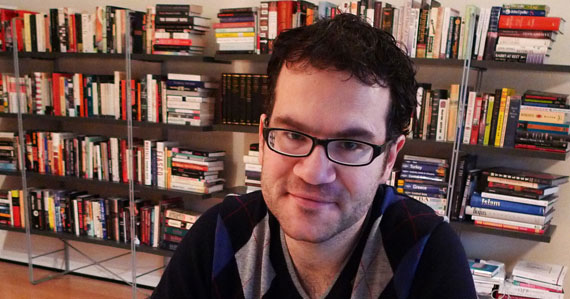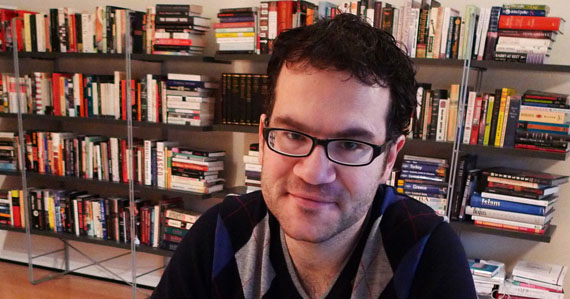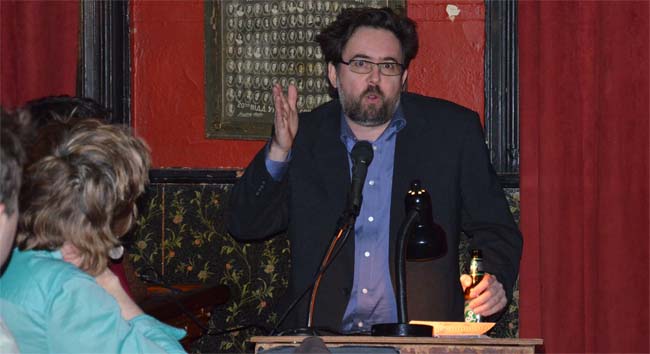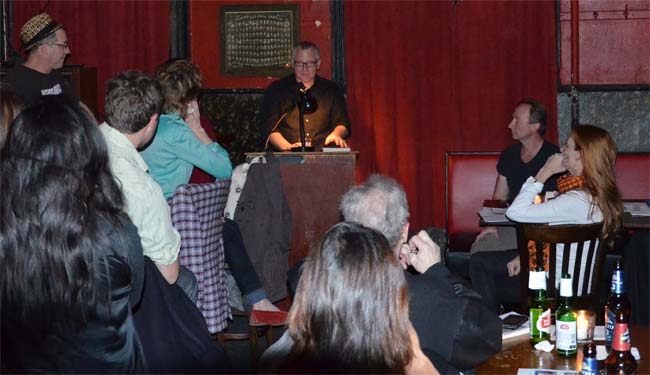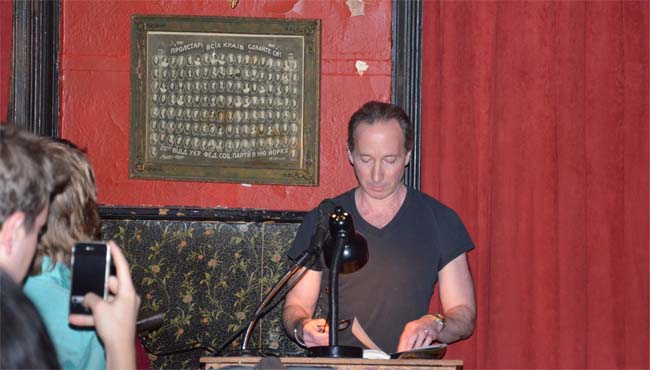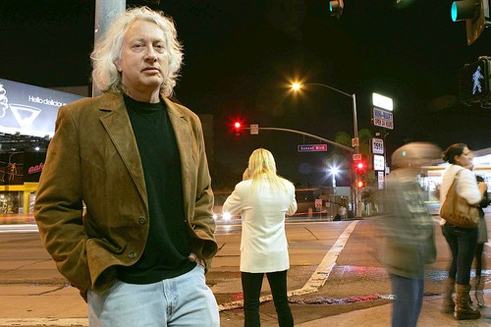Tom Bissell appeared on The Bat Segundo Show #450. He is most recently the author of Magic Hours. This is the second of a two-part conversation. The first part establishes Bissell’s peripatetic history and gets into his recent shift into video games, and can be listened to here. The second part gets into some entirely unanticipated truths about the relationship between life and words in 2012, among many other subjects.
Listen: Play in new window | Download
Condition of Mr. Segundo: Making the unanticipated five year wait count for something.
Author: Tom Bissell
Subjects Discussed: How Bissell’s father was depicted in Philip Caputo’s A Rumor of War, being a man with the average sadnesses, how assembling an essay collection allows one to see a life history, Bissell becoming comfortable in not presenting himself as a Wallace-like buffoon, early self-serious days working at a literary house, watching Jeff Daniels make a movie, cringing at your earlier work while reading it before a large crowd, not succumbing to glumness, abandoning the puckish but tart essays, finding humor in Werner Herzog, Bissell’s confessional streak, the lightning bolts of personal revelation, being powerless to make moves in an essay, the diminishing covenant of privacy between author and reader, the creative impact of assuming that most readers are coming into an essay for the first time, unearned intimacy, John D’Agata, not writing magazine journalism in present tense, when bad boy memoirs become ghoulish in changing tense, distinguishing one’s self from the compulsively confessional, maintaining a low-key online presence, responsibility on the page, deleted tweets, when people remark upon and say mean things about you online, the perils of Twitter Search, negative Goodreads reviews, taking on Robert D. Kaplan in Chasing the Sea and in Magic Hours, being angered by Imperial Grunts, rescuing Paula Fox, the Underground Literary Alliance, Bissell’s crusading impulses, writing negative reviews in the New York Times Book Review, Scott Spencer, recusing yourself from reviewing, getting into an online skirmish with Jorge Volpi over a Season of Ash review, putting away the remnants of Bissell’s mean streak, underrepresented voices vs. bad writing, George Plimpton’s invitation to the ULA, finding ways to calm down “boors” and be inclusive of more outsiders in the literary community, King Wenclas as a room wrecker, common embitterment about the publishing system, Katherine Boo’s Behind the Beautiful Forevers, good writing and sincerity, being a “literary insider,” tolerating bad behavior, needless competition within the literary world, star systems within the publishing industry, varying notions of success, the dubious monolithic stature of The New York Times Book Review, Bissell’s negative review of David Mitchell’s Cloud Atlas, whether we should give a damn about critical culture in 2012, James Wood, Dwight Macdonald’s “By Cozzens Possessed,” whether literary culture is more healthier than ever or starving, Dan Josefson’s That’s Not a Feeling, the problems with too many long-form online critical mechanisms, how the group blog made keeping tabs on culture a full-time job, how the Internet has altered time commitments and responsibilities, the future of Bissell’s fiction, listening to the world in a smartphone age as an eccentric or subversive act, how brains are rewired by electronic interfaces, false blame on video games, A Clockwork Orange, the impact of newspaper headline editors, chewing nicotine, obsessiveness, using words like “nummular,” learning 50 Uzbek words a day, achievements and gamification, setting goals, writing about The Room, “Bissellmania,” Jim Harrison, and the creative benefits of being in a stable relationship.
EXCERPT FROM SHOW:
Correspondent: In The Father of All Things, you remarked on how your father was depicted in Philip Caputo’s A Rumor of War, where Caputo, he remarks that your father is very funny in telling all these jokes to the other soldiers in the face of tragedy. You wrote back then, “I saw the still normal man my father could have become, a man with the average sadnesses.” I’m wondering if assembling the essays for this collection was in some weird way an effort to look at yourself in the same way. Do you feel that you saw a younger Tom with these average sadnesses or anything like this? Some image of what your life could have become? I mean, I also note this because there’s an interesting sentence you write in “Unflowered Aloes” — the first essay, the youngest one — where you say, “For intellectuals, destiny as it applies to life is a ludicrous thought. But destiny as it applies to works of fiction and poetry goes largely unquestioned.” So do you subscribe to any peculiar destiny these days? What of this?
Bissell: The earlier essays are the ones that I was most hesitant to include in the book at all. They’re basically — I’m sure you think this way when you look at your own stuff that’s older than, say, five years. Basically, it’s a stranger’s work, right? And I once imagined that if I ever did a nonfiction thing, I’d have all the pieces that I’d ever wrote and it would be a big chunky thing. No one wanted to do that obviously. There’s a lot of essays that I could have included, but I didn’t. Just because they were so sloppy in their thinking and they were so — what I’m saying now gets into self-congratulatory territory. Because the presupposition is that your recent work is not perfect. And that’s not what I’m trying to say. But I think you can see in the essays, and I noticed this when I was going over them, is a journey from someone who has become gradually more comfortable not presenting himself as a [DAvid Foster] Wallace-like buffoon, and actually becoming someone who is able to be present in a piece, and I hope be honest and not have these kind of ridiculous squirting boutonniere moments where you’re somewhat desperately trying to get the reader’s affection and attention. So I think I’ve become a less needy presence. And I think my interests — I feel like when I’m talking about intellectuals in that first piece, I mean, all the stuff I said, I more or less believe. I was a somewhat self-serious person then. And I was working for this literary house. And you can see the tone varies in a lot of the pieces. The tone is often directly reflective of where I was living even physically, and the experiences I’d gone through. And maybe the more average experiences I’d had until that point, I think there’s a temptation to actually make more of your experience than can really be made of it. And the Escanaba essay, which is the second essay in the book about watching Jeff Daniels make this movie about my hometown, I read it aloud at Bookcourt the other night. And I kind of kept stopping and apologizing to the audience almost for the histrionic tone. (laughs)
Correspondent: I think most writers of personal journalism or confessional essays tend to do that — especially if it’s been a long while. I know Jonathan Ames does that. I’ve seen other writers do that.
Bissell: Well, I’m glad I’m not alone then.
Correspondent: They’re embarrassed. “Oh my god. I can’t believe I wrote this about myself.” I think that’s a very human reaction. But on the other hand, I mean I have to say, if the yardstick here in comparison to your father is yourself, do you see the typical sadnesses at all that you saw as Caputo depicted your father? Or anything like that?
Bissell: I don’t know. I do know that in some of the experiences I had immediately after September 11th, then covering the wars in Afghanistan and Iraq, I became a lot more concerned with making my work as funny as possible. (laughs) And maybe that was just an attempt to not succumb to a kind of glumness about — oh, this is just veering off into territory that I’m not even sure I understand. But I became way less interested in the kind of essay I would have written — like “Unflowered Aloes.” A puckish but tart stately essay, right? And I just became more interested in stuff that puts it out there on the line emotionally, but is primarily concerned with exploring the absurd and the humorous parts of these people. And I try to do that even in the Werner Herzog essay, which — he’s not the easiest subject in the world to wring a lot of humor out of. But I don’t know. I’m not sure. I feel like I have not answered your question at all.
Correspondent: Well, this is actually all good. Maybe another way to phrase it is this. I mean, there seems to me to have always been some interesting confessional streak in your writing. I think of when you finally spill about your fiancée in Chasing the Sea. I think, of course, of the ultimate example. It’s probably the last chapter in Extra Lives. I think of your decision in the Jim Harrison essay to basically announce at the end, “I’m giving up teaching.” These are really bold — I mean, very bold, quite frankly — ways to find a personal connection into someone who you clearly revere or some thing — like Grand Theft Auto — that you clearly revere. And I’m wondering. Why do you feel this need to do this? And why has it been blowing up with, I suppose, even more extraordinary pronouncement? “Hey, I went ahead and had this coke breakdown.” Or “I am packing up my life entirely and maybe if you follow me in the next essay, I’ll tell you how things are going.”
Bissell: (laughs)
Correspondent: It also causes, at least this reader, to say, “Fuck! I hope Tom is okay!” (laughs)
Bissell: (laughs)
Correspondent: So my question is: is this an effort to draw either longtime or short-term readers into what you’re doing? Does it provide a greater authenticity? Is it a way of shaking off the sort of smarmy, sort of semi-self-confident guy in “Unflowered Aloes”? What of this? Why?
Bissell: I think some of this must come from having started as a fiction writer and being profoundly uninterested in nonfiction for a long time. And so when you’re writing fiction, there are these lightning bolts of revelation from your own life, your own experience, that are being superinjecting that into the story or paragraph you’re working on. It’s easy to do in fiction. Because no one asks any questions, right? But that electricity is actually what gives fiction its texture. And without that sensed personal connection between writer and material, even if it’s not autobiographical material, there’s that electric sense that this voice knows of what it speaks. And for me, informational nonfiction, nonfiction that doesn’t have an identifiable human being in it, I mean, I could not care less about reading that stuff. And so I realize I confess things in my pieces not out of any real objective or desire. It just seems to be the move that I’m driven to make. Like I didn’t have any idea when I was writing the Grand Theft Auto essay that I was even going to get into my collapse. Into cocaine. No idea. I just started writing the essay and it just started coming out. I didn’t even know that I was going to get into the quitting my teaching thing literally until the moment I got there. So, believe it or not, those moves are like — I’m almost powerless to not do them in some strange way. They’re never — and here’s my defense. Teaching doesn’t come up in that whole essay until the very end. (laughs)
Correspondent: (laughs)
Bissell: So I hope structurally I’m proving my point. And I could have gone back.
Correspondent: But in an age of Google, I mean, we can find out. The reader can find out. “Oh, Tom was teaching somewhere. Wait. What the hell? He’s no longer teaching and he’s telling us this in his essay?” I mean, part of me almost wants to say, in an age where that covenant of author-reader privacy is diminishing, where the author is now expected to tell everything about himself — because everybody is spilling everything about themselves on Facebook, on Twitter, on Tumblr, on whatever — I’m uncomfortable with that idea too. Because I feel, well, why must the author confess everything? Unless it’s pertinent to the piece. This is why I say to myself, well, the bigger leap. If you don’t know where it comes from, and it sometimes gets out there, well, it seems like you’re working in terrain that’s very uncontrolled. What do you do to make sure you don’t say too much?
Bissell: Decorum. My girlfriend. (laughs)
Correspondent: (laughs) What army? What vanguard is there to prevent you? “Hey, Tom, you can’t say this!”
Bissell: Well, I think that less than 1% of my readers are keeping track of me, right? And so in one sense, I’m assuming that everyone who reads something of mine is coming to me for the first time. And so I don’t presume that they have any concern for what’s going on before with me. And especially with my video game book, I think a lot of people read it not even knowing that I had this career as a literary writer before that. So I’m just assuming that the slate is blank. And I guess maybe these bombs get dropped in there to assert some kind of — well, I guess it’s reasserting the pact of intimacy between the reader and the writer. And that intimacy is not always there in nonfiction. It’s not even really expected. And what’s weird is that, as a nonfiction writer, you start off with this utterly unearned intimacy. Which is the intimacy that, well, I’m telling you the truth. And that’s the moral bond between the nonfiction reader and the nonfiction writer. “What I’m telling you is true.” And so you start on this very intimate terrain. And then I think a lot of nonfiction writers never really wander off that terrain. That that’s enough. And for me, it’s not enough.
Correspondent: On the other hand, the extreme version of that would be someone like John D’Agata or Mike Daisey, who basically throw that trust into the water and piss a lot of people off and perhaps, depending upon where your point of view is, destroy their credibility as someone who can share a story or who can even share some acceptable version of the truth, if that makes any sense. It seems to me that your confessional streak is both bomb-dropping but also just enough for us to maintain that covenant. Yet I know you’ve also taught About a Mountain at Portland. And so forth. So do you see yourself possibly entering into “Hey! I really wasn’t telling the truth about this. Fuck you.”
Bissell: (laughs) Well, here’s an interesting point that I will make that I will stand by. I never anymore write magazine pieces in the kind of magazine journalism present tense. Ever. I kind of loathe the nonfiction present tense. And I loathe it because — especially if you’re writing about yourself — when you write in the present tense, you are almost foreclosing any possibility of reflection. And you almost don’t have to account for your decisions or your behavior. And that’s why all bad behavior memoirs are always written in the present tense. “I slapped the hooker. And then I did another line. And then I staggered out and slept with the cab driver.” Now: “I slap the hooker, step outside. I snort another line of coke. I sit down with the cab driver.” No. I’m doing this in present tense. But you turn that into past tense and suddenly it doesn’t work anymore. Now it just seems ghoulish and there’s no sensationalistic fizziness to it. And you just have a reader that’s just saying, “Well, wait a minute? Why did you do these things?” Right? So you’ll notice that I never ever, ever write in the present tense when it comes to nonfiction. And I really, really strive when I do go into confessional mode to keep part of the partition up. I have no interest in revealing the details of my life if they’re not relevant to what I’m actually writing about. And I hope that would distinguish me from some people who seem compulsively confessional. That I would like to think that the stuff that I’m letting loose has a direct emotional bearing on the material that’s under investigation.
(Photo: Trisha Miller)
The Bat Segundo Show #450: Tom Bissell, Part Two (Download MP3)
